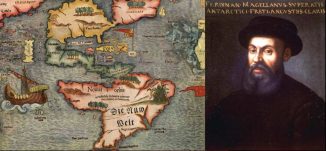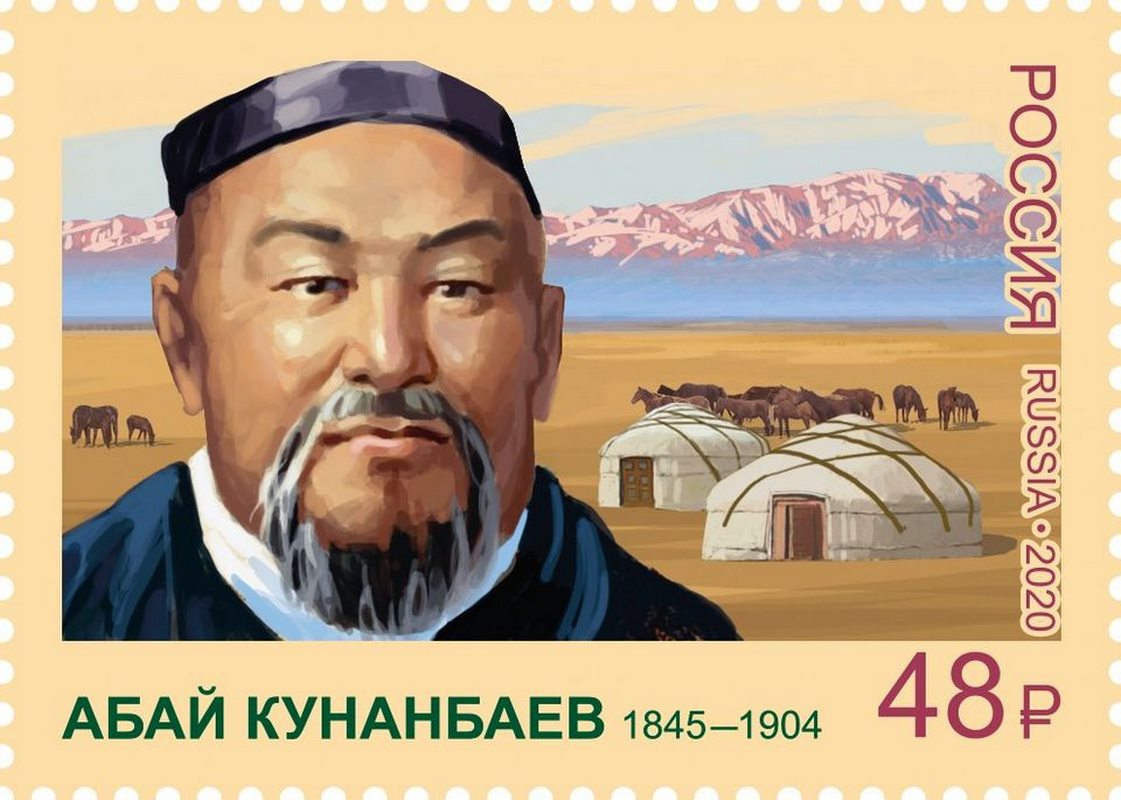179 years ago today, one of the absolute most important forerunners of the modern Kazakh nation-state was born. Abai Qunanbaiuly, known around Eurasia simply as Abai, was a poet, translator, and Islamic theologian philosopher who contributed to a revolution of thought that underpins much of Kazakhstan’s national identity today. READ some of what he did throughout his life… (1845)

Profound socio-economic changes throughout Kazakhstan at the time of Abai’s early life allowed this rural, Islamically-educated young Kazakh to read a variety of material from across Asia, Russia, and Europe. He was fond of Eastern Islamic poetry like the Shahmenah, as well as Russian authors like Pushkin and Lermontov. His father hoped his son would become a lawyer and aid in the legal disputes between rival clans in eastern Kazakhstan that sometimes became violent.
Instead, by the age of 35, Abai began to devote serious attention to his own poetry, but being by all accounts an incredibly humble person, attributed many of his poems to other names. Only at age 41 did he sign a poem (“Summer”) with his own name. Eventually, these poems made Abai hugely popular throughout the Kazakh steppes. He introduced a number of new prosodic forms into Kazakh literature, for example, the hexameter.
Abai’s writings did much to preserve Kazakh folk culture amid harsh colonial conditions. His major work The Book of Words (Kazakh: Qara sözderi), is a philosophical treatise and collection of poems where he criticizes Russian colonial policies and encourages other Kazakhs to embrace education and literacy.
His other important contributions were the translations of several important authors, including Pushkin, Goethe, and Lord Byron, into the Kazakh language. Below is an excerpt of one of his many nationally-flavored poems.
Oh my luckless Kazakh, my unfortunate kin,
An unkempt moustache hides your mouth and chin.
Blood on your right cheek, fat on your left —
When will the dawn of your reason begin?
Your looks are not bad and your numbers are vast,
Yet why do you change your favors so fast?
You will never listen to sound advice,
Your tongue in its rashness is unsurpassed. (…)
Kinsmen for trifle each other hate.
God bereft them of reason — such is their fate.
No honor, no harmony, only dissent;
No wonder cattle is scarcer of late.
MORE Good News on this Day:
- Islam’s prophet Muhammed began receiving the Qur’an on the first Laylat al-Qadr (610)
- Candid Camera made its US television debut after being on radio for a year as Candid Microphone (1948)
- The groundbreaking ceremony for the Saint Lawrence Seaway was held in Massena, New York (1954)
- Japanese-Americans who were either interned or relocated by the U.S. government during World War II would each receive $20,000 payments because The Civil Liberties Act of 1988 was signed (1988)
- Ruth Bader Ginsburg was sworn in as the second female Supreme Court justice (1993)
- The robotic probe Magellan successfully inserted itself into Venus’s orbit, launched from a NASA Space Shuttle one year earlier to map the surface of Venus and collect data — the first spacecraft to test aerobraking as a method for circularizing an orbit (1988)
- American swimmer Michael Phelps won the first of a record eight gold medals at the Beijing Olympics by smashing his own world record in the 400-meter individual medley (2008)
121 years ago today, Anthony Pratt was born. Pratt’s claim to fame was his conversion of the popular social party game Murder into a tabletop board game known today as Clue or Cluedo in the UK. Living as an assemblyman in a munitions factory in England during the Second World War, Pratt felt that the conflict was killing the social life of the nation. The original characters were to be Dr. Black, Mr. Brown, Mr. Gold, Reverend Green, Miss Grey, Professor Plum, Miss Scarlett, Nurse White, Mrs. Silver, and Colonel Yellow.

Pratt was inspired by the social game Murder, organized at an event such as a ball with many people present, the organizer would nominate a person as the murderer, who could ‘murder’ people by sneaking up on them and surprising them with a shout. All the party guests would have to use clues to solve the mystery by officially accusing someone.
When the war was over, the Pratts demonstrated the game to their friends who loved it, and Anthony’s wife Elva convinced him to pitch his idea to Waddingtons, a gaming business.
Across the pond, Parker Brothers, the American game manufacturer that produced Monopoly, was excited about Pratt’s invention. To produce the mystery game for Americans, Parker Brothers gave Waddingtons the rights to Monopoly in exchange for the ones to Pratt’s.
When Cluedo was released, it became a hit among gamers and mystery lovers alike. It became a household name as families and friends have fun figuring out whodunnit. When the game was released internationally, it was expanded to include more colorful suspects, crime scenes, and murder weapons. In more than forty countries, Cluedo’s rated as the most famous tabletop game, second to Monopoly. (1903)
Happy 77th Birthday to Ian Anderson MBE, the Scottish-born musician, singer-songwriter, and multi-instrumentalist who was the lead “actor,” voice, and flute player in Jethro Tull. Anderson as a singer-songwriter was fascinated by the fringes of society that was rapidly modernizing during his life. The woodsman, the lighthouse tender, the beggar, travelers, these were often the focus of his musical content, and while his music has often been called prog rock, that element of folk music has always been there. 
Anderson abandoned his ambition to play electric guitar before Jethro Tull had released their first album, allegedly because he felt he would never be “as good as Eric Clapton”. As he himself tells it in the introduction to the video Nothing Is Easy: Live at the Isle of Wight, he traded his electric guitar in for a flute.
According to the sleeve notes for the first Tull album, This Was, he had been playing the flute only a few months when the album was recorded. His guitar practice did not go to waste either, as he continued to play acoustic guitar, using it as a melodic and rhythmic instrument. As his career progressed, he added soprano saxophone, mandolin, keyboards, and other instruments to his arsenal.
His tendency to stand on one leg while playing the flute came about by accident, as he had been inclined to stand on one leg while playing the harmonica, holding the microphone stand for balance. Anderson was known for his famous one-legged flute stance, and was once referred to as a “deranged flamingo”
While 2016 marked 45 years since the release of Tull’s landmark album Aqualung, it brought a new tour for Ian Anderson, under the name “Jethro Tull – The Rock Opera.” WATCH a fantastic video of Anderson explaining classical arrangements of Tull hits in 2016…(1947)
178 years ago today, the Smithsonian Institution was first chartered, named after the British scientist, James Smithson, who bequeathed $500,000 to create a great museum in Washington, D.C. even though he had never visited the United States. With the aim of advancing science and mankind’s knowledge, the federal government administers and partially funds the 19 museums (and the National Zoo) in the nation’s capital.
Displaying a vast collection of 1.43 million items for public view, perhaps the best aspect of the Smithsonian has always been the free admission offered for all. WATCH a video about how the ruby slippers from The Wizard of Oz were preserved by the Smithsonian after 80 years… (1846)
On this day in 1793, the Louvre Museum was officially opened in Paris. A royal palace on the banks of the Seine, it was suddenly possible for the public to enter and view the many art treasures, including the Mona Lisa, confiscated from the French king, his cronies, and the church, during the revolution.

The world’s largest and most famous art gallery—with a record 8.1 million visitors last year—added a distinctive glass pyramid entrance during a renovation in the 1980s.
The royal collection had contained more than 20,000 pieces, including the ancient Greek statue of Venus de Milo. The collection has grown steadily with donations and bequests, and is divided into eight departments: Egyptian Antiquities; Near Eastern Antiquities; Greek, Etruscan, and Roman Antiquities; Islamic Art; Sculpture; Decorative Arts; Paintings; Prints and Drawings. Last year, the Musée du Louvre featured an extensive Delacroix exhibition and a self-guided tour of the 17 artworks around which Beyoncé and Jay-Z filmed the music video to kick off their collaborative album, Everything is Love.
64 years ago today, Los Angeles moviegoers experienced Alfred Hitchcock’s Psycho for the first time. After wrangling with movie censors over controversial scenes—the opening shot contained an unmarried couple sharing a bed, the lead actress Janet Leigh in a bra, the infamous shower scene which was unprecedented, and the first close-up shot of a toilet flushing—the director ended up cutting very little.

It also may have been the first time the viewing public in the US was required to arrive before the opening scene, with Hitchcock believing the audience would have felt disappointed having not seen the bedroom scene.
The movie starring Anthony Perkins has consistently ranked as one of the best films of all time. It made a lot of money, too, with people lining up around the block to be there on time. Nominated for four Academy Awards, including Best Supporting Actress for Leigh and Best Director for Hitchcock, Psycho centers around a woman who ends up at a secluded motel, after stealing money from her employer, and the Bates Motel’s owner-manager, Norman Bates, played by Perkins.
The shower scene has become a pop culture touchstone and is often regarded as one of the most terrifying scenes ever filmed. Even though few details are shown, the horror comes from the unique and startling shot sequence borrowed from the Soviet montage filmmakers, and the iconic screeching violins in Bernard Herrmann’s musical score. (1960)
And, on this day in 1519, the Portuguese explorer Ferdinand Magellan set sail from Seville, Spain—an expedition that circumnavigated the globe for the first time.
 A hardy sailor at a young age, Magellan was born into a Catholic society that believed it was their mission to convert the world to Christianity—but there was another goal. Seven years earlier, he captained a voyage to the legendary Spice Islands in Asia (the Moluccas), home to nutmeg and clove trees. These precious exotic flavors were worth their weight in gold—and Magellan’s share in their sale back in Europe sparked his desire for more wealth. Extremely charismatic, he convinced the King of neighboring Spain to bankroll his latest expedition—to discover a new passage to the Spice Islands, between the Atlantic and Pacific oceans, which would avoid Portuguese battleships in the southern horn of Africa.
A hardy sailor at a young age, Magellan was born into a Catholic society that believed it was their mission to convert the world to Christianity—but there was another goal. Seven years earlier, he captained a voyage to the legendary Spice Islands in Asia (the Moluccas), home to nutmeg and clove trees. These precious exotic flavors were worth their weight in gold—and Magellan’s share in their sale back in Europe sparked his desire for more wealth. Extremely charismatic, he convinced the King of neighboring Spain to bankroll his latest expedition—to discover a new passage to the Spice Islands, between the Atlantic and Pacific oceans, which would avoid Portuguese battleships in the southern horn of Africa.
The 270 men carried supplies to sustain two years of travel aboard five ships, but they were essentially “wooden tubs” that had no toilets, privacy, or kitchens on board—and as the mood soured, a mutiny broke out. Despite that, the tenacious Magellan reached the southern tip of South America and discovered a cape. His fleet sailed into the labyrinth of unpredictable winds and currents at Tierra del Fuego—and the 350 miles of narrow waterways claimed one ship (while another took advantage of the confusion and fled back to Spain). But Magellan was ultimately victorious, using his longed-for passage to reach the Pacific Ocean in six weeks…
Finally, with his three remaining ships, he landed in the Philippines—the first Europeans to ever arrive—and though large numbers of the population converted to Catholicism (and still remain so, to this day), one island was hostile to the foreign threats and Magellan was killed in battle.
Two vessels quickly turned back, but, under the command of Juan Sebastian Elcano, the remaining ship reached the Spice Islands, where it finally collected the long-desired spicy cargo and returned to Spain via the Cape of Good Hope, completing the unintended circumnavigation of the world and proving the Earth was round.
The Victoria docked in a Spanish port three years after setting sail with about 20 surviving crew members to tell the tale—and the western passage around South America has been named the Strait of Magellan ever since. The fearless explorer inspired countless missions over the next five centuries, even into outer space—with NASA naming its successful Venus probe Magellan.
He once said, “The church says the earth is flat; but I have seen its shadow on the moon, and I have more confidence even in a shadow than in the church.”
“The sea is dangerous and its storms terrible, but these obstacles have never been sufficient reason to remain ashore… Unlike the mediocre, intrepid spirits seek victory over those things that seem impossible… It is with an iron will that they embark on the most daring of all endeavors… to meet the shadowy future without fear and conquer the unknown.” ― Ferdinand Magellan
SHARE the Milestones, Memories, and Music…





















